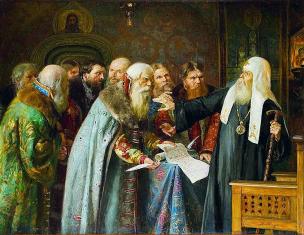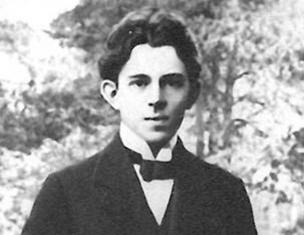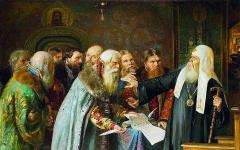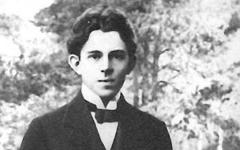Izyaslav was the eldest son of Yaroslav I Vladimirovich, Grand Duke of Kyiv, and the Swedish princess Ingigerda, named Irina after baptism. Izyaslav was born in 1024. After the death of his father in 1054, he became the heir to the Principality of Kyiv and then divided the lands between his brothers Svyatoslav II, Vsevolod I and Igor, according to the will of his father. The first years of Izyaslav's reign were not particularly tense, although he did undertake several campaigns against external enemies. And within Rus' there were no internecine wars for ten years.
Izyaslav's struggle for power
Beginning in 1067, the idyll ended. The Troubles were initiated by the Polotsk prince Vseslav, who believed that by law and by kinship he had the right to reign in Kyiv, since he was the great-grandson of the Grand Duke of Kyiv Vladimir. Vseslav provocatively attacked Novgorod, took it and plundered it, although Novgorod was in the legal possession of Izyaslav.
Izyaslav called his brothers for help, and together they went to war against Vseslav. The brothers won the battle with him on the Neman, but Vseslav managed to escape. Izyaslav offered to negotiate with him, inviting him to his tent. But as soon as the delegation (Vseslav and his two sons) appeared in the tent, they were immediately arrested and sent to prison.
Conflict between Izyaslav and his squad. Escape to Poland
In the next Polovtsian raid (1068), Izyaslav and his brothers were defeated on the river. Alte. Izyaslav led the remnants of the army back to Kyiv. But his warriors, having a hard time experiencing the defeat, in a very rude manner began to demand horses and weapons from the prince in order to go to war again. Outraged by the impudent tone of the ultimatum, Izyaslav refused to comply with the demands of his squad. This provoked a rebellion in its ranks, as a result of which the rebels rescued Vseslav from prison and even declared him their sovereign. Izyaslav had to quickly leave Kyiv. In Poland, where he went, he was received well, because the king there was Boleslav II, a relative of Izyaslav.
Return of Izyaslav to Rus'
Izyaslav, in alliance with Boleslav and his army, returned to his homeland (1069). Vseslav allowed them to reach Belgorod unhindered, and then with his army he went to meet them. But he did not start a battle, either fearing the superior forces of the Polish army, or doubting the loyalty of the Kievites. He simply abandoned his squad and returned to his Polotsk, and the Kievans abandoned by the “sovereign” were forced to return to their home in Kyiv. Through the mediation of Izyaslav's brothers - Svyatoslav and Vsevolod - they admitted their guilt and asked the Grand Duke to return to reign in Kyiv. So Izyaslav regained his power in the capital.
Izyaslav's revenge. New escape
Wanting to take revenge on Vseslav, Izyaslav captured Polotsk (1071). Vseslav responded by attempting to take Novgorod, but to no avail. As a result of several clashes, Vseslav still managed to regain Polotsk. While the Russian princes were sorting out their relationship, the Polovtsians were destroying villages along the banks of the Desna. The Chernigov prince Svyatoslav convinced Vsevolod that their brother Izyaslav had gone over to the side of Vseslav of Polotsk and was preparing a conspiracy against the brothers. Vsevolod and Svyatoslav eventually united against Izyaslav.
Izyaslav again fled to Poland (1073). But Boleslav was in no hurry to help this time. Then Izyaslav turned to Emperor Henry IV (Germany). He made an attempt to help. He sent his messenger to Kyiv with an ultimatum: if you don’t return power to the rightful prince, we will start a war with you. Svyatoslav, who was sitting in Kyiv, went to bribe the ambassador and Emperor Henry. Having received generous gifts, Henry did not send his troops to Rus'. Izyaslav then turned to the Pope for intercession. But the petition of Pope Gregory the Seventh was not needed.
Again in Kyiv
In 1076, Izyaslav’s brother Svyatoslav, who had once overthrown him from the Kyiv throne, died. Izyaslav returned to Kyiv, and in 1077 he made peace with his brother Vsevolod, concluding peace with him. But peace in the country did not last long. IN internecine wars Izyaslav’s nephews, also seeking power, became involved. The year 1078 brought the following events: book. Oleg Svyatoslavovich and Boris Vyacheslavovich hired the Polovtsians, came to Chernigov and defeated Vsevolod’s troops. Vsevolod fled to Izyaslav in Kyiv. He immediately headed to Chernigov. The battle took place near the city walls. Prince Izyaslav died in this battle.
Izyaslav's trace in history
As statesman Izyaslav supplemented the Russian Pravda, a collection of civil laws introduced by his father Yaroslav. These additions are called “Izyaslav’s Truth,” according to which the death penalty was prohibited in Rus'. The founding of the Kiev-Pechersk Monastery, which is still famous today, is also the merit of Izyaslav.
IZYASLAVIYAROSLAVICH
1054-1068, 1069-1073
Izyaslav Yaroslavovich
Izyaslav's reign
Predecessor - Yaroslav the Wise
Heir - Svyatoslav II
Religion - Orthodoxy
Birth - 1025
Death - 1078 Kievan Rus
Rod - Rurikovich
It is known that Izyaslav was married to Gertrude, daughter of the Polish king Mieszko II Lambert
sons
- Yaropolk - Prince of Volyn and Turov, it is also known that Gertrude calls Yaropolk in her prayer book (the so-called Gertrude's code) his "only son". According to the assumption of A.V. Nazarenko, the Vsevolodkovichs, the rulers of the Goroden principality, descend from him.
Perhaps another unknown woman, perhaps Izyaslav's wife, was the mother of his two more famous sons:
- Svyatopolk (Svyatopolk II) Izyaslavich (-) - Prince of Polotsk (-), Novgorod (-), Turov (1088-), Grand Duke of Kiev (1093-1113), and his descendants in the XII-XIII centuries continued to reign in their ancestral Turov.
- Mstislav - Prince of Novgorod (-).
Daughter
- Eupraxia Izyaslavna, wife of Mieszko Boleslavich, Polish prince (married)
Izyaslav I Yaroslavich (1054-1068,1069-1073,1077-1078)
Father - Grand Duke of Kiev Yaroslav I Vladimirovich (Izyaslav is his eldest son).
Mother - Yaroslav's wife, Swedish princess Ingigerda (baptized Irina).
Izyaslav I Yaroslavich was born in 1024. He received the Great reign of Kiev according to his father’s will immediately after his death in 1054. Then, in accordance with the will of his father, he divided the lands with his brothers: Svyatoslav II Yaroslavich, Prince of Chernigov, who received Tmutarakan, Ryazan, Mur and the lands of the Vyatichi; Vsevolod I Yaroslavich, Prince of Pereyaslavsky, who received Rostov, Suzdal, Beloozero and the Volga region, and Igor Yaroslavich, who received Vladimir.
The first ten years of Izyaslav's reign can be called relatively calm, at least they were not overshadowed by any internal strife.
Relations with external neighbors were somewhat worse. Izyaslav went on a campaign against the Latvians and Golds; both trips were successful.
In 1061, the Polovtsians, steppe nomads who appeared on the southeastern borders of Rus' and ousted the Pechenegs from these places back in 1055, first attacked the territories belonging to Kievan Rus, and defeated the army of Vsevolod I Yaroslavich, Prince of Pereyaslav, brother of Izyaslav. From that time on, raids were repeated constantly, bringing devastation to Rus'.
Izyaslav entered into negotiations with the rebellious prince Vseslav: swearing that he would not cause him any harm, he invited him to his tent. And as has already happened in Russian history, as soon as Vseslav entered Izyaslav’s tent, he and his two sons were immediately captured and sent to a Kyiv prison.
In 1068, during another Polovtsian raid, the army of Izyaslav and his brothers was defeated on the banks of the Alta River. Grand Duke Izyaslav with the remnants of the army returned to Kyiv. His warriors took their defeat seriously: they wanted to fight and demanded that the prince provide them with weapons and horses. Izyaslav was outraged and offended. As a result, he refused to give anything away. The refusal sparked a riot. First of all, the rebels freed Prince Vseslav of Polotsk from prison and proclaimed him “their sovereign.” Izyaslav was forced to flee Kyiv.
Prince Izyaslav went to Poland, where he was well received, since Poland at that time was ruled by King Boleslav II of Poland, the son of Princess Maria, daughter of Grand Duke Vladimir and, therefore, a close relative of Izyaslav.
In 1069, Izyaslav, together with Boleslav II and the Polish army, returned to Rus'. They reached Belgorod unhindered and only then Vseslav came out with troops from Kyiv to meet them. But he did not want to fight, perhaps fearing the superior forces of the enemy or not hoping for the loyalty of the Kievites.
Therefore, one fine night he took off and went to his place in Polotsk, leaving his army to the mercy of fate. The people of Kiev also had no choice but to return back to Kyiv.
Naturally, they (the Kyivians) feared the wrath of the legitimate prince, whom they drove out of the city in the most disrespectful manner, and even more they feared the Poles, who already had the opportunity to rule in Kyiv back in the time of Yaroslav; father Izyaslav. Therefore, the people of Kiev turned to Izyaslav’s brothers Svyatoslav and Vsevolod for intercession, saying that they would admit their guilt before the Grand Duke and would be glad to see him again in Kyiv, but only if he came with a “small squad.” Svyatoslav and Vsevolod acted as intermediaries, and as a result, Izyaslav reigned again in Kyiv.
First of all, Izyaslav hastened to take revenge on Vseslav and took Polotsk by storm. Vseslav, in turn, tried to capture Novgorod, but failed. This senseless war continued for some time with varying success, and Izyaslav’s sons also took an active part in it. As a result, Vseslav managed to regain Polotsk.
At this very time (1071), when the Grand Duke of Kiev was busy with revenge, the Polovtsy, without any obstacle, plundered the villages located along the banks of the Desna.
N.M. Karamzin wrote that “the union of the Yaroslavichs seemed inextricable.” (Karamzin N.M. Decree. Op. T. 2 P. 46.) But this friendship did not last long. Svyatoslav, Prince of Chernigov, apparently was tired of being content with little. In any case, he proved to Vsevolod that their older brother Izyaslav was conspiring against them with Vseslav of Polotsk behind their backs. These explanations seemed sufficient to Vsevolod, and he united with Svyatoslav against Izyaslav.
In 1073, frightened by this, Izyaslav again fled to Poland.
This time Boleslav II was in no hurry to help him. Izyaslav went further to the German Emperor Henry IV in Mainz. Henry, it seems, was happy to help and even sent an ambassador to Kyiv demanding the return of the throne to the rightful prince and threatening to start a war otherwise. But, on the one hand, Svyatoslav, who seized power in Kyiv, gave such gifts to the ambassador and the emperor himself that both were completely delighted, and on the other hand, Henry simply had no real opportunity to send an army to Rus': it was too far, and even his own The German sovereign had enough of his own problems. Izyaslav, however, did not stop there and asked for intercession from the Pope himself, and in return he was ready to accept the Latin faith and even the temporal power of the pope. Pope Gregory VII, famous for his power-hungry ambitions, was very interested and wrote a formal letter to the Polish king Boleslaw II with a request, or rather an order, to support Izyaslav.
But Izyaslav did not need the patronage of the Pope: in 1076, his brother Svyatoslav died, who actually drove him out of Kyiv. Izyaslav with a small number of Poles (according to the chronicler, there were several thousand of them) returned to Rus'. He met his surviving brother Vsevolod in Volhynia in 1077. Vsevolod proposed to make peace, which was done.
So Izyaslav returned to Kyiv, and his brother Vsevolod became the Prince of Chernigov. But Izyaslav’s reign this time was short-lived.
The internecine turmoil continued: the next generation of princes, Izyaslav’s nephews, did not want to wait until older generation just grow old and die, and they also sought power.
In 1078, Prince Oleg Svyatoslavich, the son of Svyatoslav P Yaroslavich, together with Boris Vyacheslavich, hired the Polovtsians, crossed the borders of the Chernigov principality and defeated Vsevolod's troops. Vsevolod fled to Kyiv to Izyaslav. Izyaslav hastened to come to the aid of his brother, equipped troops and went to Chernigov. The battle took place under the walls of Chernigov. Grand Duke Izyaslav died in it.
Izyaslav made an addition to "Russian Truth", a collection of civil laws introduced by his father Yaroslav. This addition is called "Izyaslav's Truth". In accordance with it, the death penalty was abolished in Rus'.
During the reign of Izyaslav, the famous Kiev-Pechersk Monastery was founded, which is still in operation today.
The chronicler Nestor wrote that Izyaslav had a “pleasant face and majestic figure, no less adorned with a quiet disposition, loved the truth, hated crookedness.”
To this N.M. Karamzin noted that “Izyaslav was as cowardly as he was soft-hearted: he wanted the throne and did not know how to firmly sit on it.”
IZYASLAV YAROSLAVICH(baptized Dmitry) (1024-03.10.1078) - Prince of Kiev from 1054
The second son of the Kyiv prince Yaroslav the Wise and Irina (Ingigerd) - the daughter of the Swedish king Olaf. He reigned in Turov. In 1039 he married the sister of the Polish king Casimir I, Gertrude, who took the name Helen in Orthodoxy. After the death of his father in 1054 he became prince of Kyiv.
In the first years of his reign he acted in close alliance with his younger brothers - Prince of Chernigov Svyatoslav and Pereyaslavl Prince Vsevolod. In 1058 he made a campaign against the Golyad tribe. In 1060, together with his brothers and the Polotsk prince Vseslav Bryachislavich, he defeated the Torks. In 1064, he repelled the Polovtsian invasion near the city of Snovsk. In the winter of 1067, taking revenge on Vseslav Bryachislavich for the robbery of Novgorod, in alliance with his brothers he ruined the city of Minsk. March 3, 1067 in the battle on the river. The Nemiga Yaroslavichs defeated Vseslav himself, and in July of the same year, during peace negotiations near Smolensk, breaking the oath given to the Prince of Polotsk, captured him and imprisoned him in Kyiv.
In September 1068, the Yaroslavichs were defeated by the Polovtsians on the river. Alta. Izyaslav Yaroslavich fled to Kyiv, where he refused the demands of the townspeople to distribute weapons to them and lead a new militia to fight the Polovtsians. On September 15, an uprising began in Kyiv, Izyaslav was expelled from Kyiv and fled to Poland. The Polotsk prince Vseslav Bryachislavich, released from prison, was put in his place. In May 1069, with the support of his relative, the Polish king Boleslav II, Izyaslav Yaroslavich returned to Kyiv. Before entering the city, he promised his brothers and Kievans not to take revenge on the residents Kyiv land for his exile, he sent his son Mstislav ahead of him, who executed 70 people and blinded many. The oppression by Izyaslav Yaroslavich continued after his return to the Kyiv throne. Dissatisfied Kiev residents began to beat the Poles who came with Izyaslav.
In the same year, Izyaslav expelled Vseslav from Polotsk and installed his son Mstislav as prince there. In 1072, he, together with the brothers Svyatoslav and Vsevolod, participated in the solemn transfer of the relics of Sts. Boris and Gleb to the new church in Vyshgorod. During the reign of Izyaslav, the “Truth of the Yaroslavichs” was also compiled.
In March 1073, Izyaslav Yaroslavich was again expelled from Kyiv, this time by the brothers Svyatoslav and Vsevolod, who accused him of conspiring with Vseslav of Polotsk, and again fled to Poland, where he unsuccessfully sought support from King Boleslav II, who preferred an alliance with the new Kyiv Prince Svyatoslav Yaroslavich. In the beginning In 1075, Izyaslav Yaroslavich, expelled from Poland, turned to the German king Henry IV for help. The king limited himself to sending an embassy to Rus' to Svyatoslav Yaroslavich with a demand to return the Kiev table to Izyaslav.
Having received expensive gifts from Svyatoslav, Henry IV refused further interference in Kyiv affairs. Without waiting for the return of the German embassy from Kyiv, Izyaslav Yaroslavich in the spring of 1075 sent his son Yarogyulko Izyaslavich to Rome to Pope Gregory VII, offering him to accept Rus' under the protection of the papal throne, i.e. convert her to Catholicism. The Pope turned to the Polish king Boleslav II with an urgent request to help Izyaslav. Boleslav hesitated, and only in July 1077, after the death of Svyatoslav Yaroslavich, with the support of Polish forces, Izyaslav Yaroslavich returned to the Kiev table. A year later, he died in battle on Nezhatina Niva, fighting on the side of his brother Vsevolod Yaroslavich against his nephews, princes Oleg Svyatoslavich and Boris Vyacheslavich, who captured Chernigov.
Reign: 1054-1078
From the biography
- Izyaslav is the second son of Yaroslav the Wise and his wife Ingrida (Irina)
- Together with the brothers Svyatoslav and Vsevolodovich, he initially ruled quite peacefully. In history, even all of them are called Yaroslavichs, and the rule of the brothers is called a triumviate (that is, the rule, the union of three princes). However, later the struggle for the Kyiv throne began, which in the end would lead to the death of Izyaslav.
- Nestor lovingly describes Izyaslav in The Tale of Bygone Years: “Izyaslav was a husband with a handsome face and great stature, a gentle disposition, he hated liars, and loved the truth. There was no cunning in him, but he was straightforward and did not return evil for evil.”
- Izyaslav was married to the daughter of the Polish king Gertrude
- He was buried in the Hagia Sophia Cathedral in Kyiv.
Historical portrait of Izyaslav I Yaroslavich
Areas of activity
1.Domestic policy
| Areas of activity | Results |
| The struggle for the Kyiv throne, strengthening the power of the prince. | He received the Great reign of Kiev according to the will of his father, Yaroslav the Wise, in 1054. However, in 1068 the people of Kiev, dissatisfied that Izyaslav did not give them weapons to fight the Polovtsians, installed Vseslav as prince. Izyaslav fled to Poland and only the next year - in 1069 - he returned the grand-ducal throne. 1073 - the struggle with the brothers Svyatoslav and Vsevolod. Izyaslav was overthrown, he fled for help to Poland, then to Germany, but everywhere he was refused. And only after the death of Svyatoslav did he establish himself on the throne. In 1078, a new internecine struggle began - with the nephews, the sons of Svyatoslav. And although the Yaroslavichs won, Izyaslav was mortally wounded in 1078 in the Battle of Nezhatin. |
| Further development of legislation in Rus'. | 1072 - together with his brothers, he publishes “The Truth of the Yaroslavichs.” This collection of laws supplemented the “Russian Truth” by Yaroslav the Wise, their father. Blood feud was abolished and replaced with a fine. The death penalty has been abolished altogether. Violation of property rights and attacks on the personal safety of citizens have become punishable. The purpose of the laws is to restore order in the country and protect the property of feudal lords. |
| Further development of culture. | Under Izyaslav, the Dimitrovsky Cathedral was erected in Kyiv (in baptism Izyaslav’s name is Dmitry). He allocated a place for the construction of the Kiev-Pechersk Monastery (founded in 1051), construction was carried out in 1061-1062 |
2. Foreign policy
RESULTS OF ACTIVITY
- The constant struggle for the throne took up too much time in the politics of Prince Izyaslav. Endless battles, flight, return and flight again and return to the throne again.
- The greatest merit of Izyaslav and his brothers was the adoption of the Yaroslavich Pravda. This document significantly improved the country's legislative system. Banned death penalty. And although the document primarily protected the property rights of feudal lords, it was a significant step in the development of Russian legislation.
- The prince did two great things in the field of culture: it was under him that the building of the Kiev Pechersk Monastery and the Dimitrov Cathedral in Kyiv was built.
- Internecine wars did not prevent Izyaslav from fighting external enemies. There were alternating victories with the Polovtsians, in last battle On Nezhatin he was killed. Campaigns against torks and lobster are also successful.
To summarize, I would like to note that the name of Izyaslav in the history of Russia is forever associated with the “Truth of the Yaroslavichs” and the construction of the Kiev-Pechersk Monastery. This is his great merit.
Chronology of the life and work of Izyaslav I Yaroslavich
| 1024-1078 | Years of life |
| 1054-1078 | Great reign of Izyaslav with interruptions (1054-1068, 1069-1073, 1077-1078) |
| 1058 | A successful trip to the loach. |
| 1061 | The first attack of the Polovtsians on Rus' began a protracted struggle with them. |
| 1061-1062 | Construction of the Kiev-Pechersk Monastery. |
| 1064 | Izyaslav repels the attack of the Polovtsians. |
| 1068 | The Polovtsians approached Kyiv. For refusing to give weapons to the townspeople, Izyaslav was deposed. Vsevolod ascended the throne, |
| 1068 | Battle with the Polovtsians on the river. Alte. Defeat of the Yarslavichs. |
| 1069 | An unsuccessful attempt to return the throne, but another brother, Svyatoslav, is already in power. Only after the death of Svyatoslav Izyaslav came to power, Yaroslav voluntarily gave him the throne. |
| 1072 | Adoption of the Yaroslavich Pravda. |
| 1078 | The Battle of Nezhatin with Svyatoslav’s nephews and children. Death of Izyaslav. He was buried in the Hagia Sophia Cathedral in Kyiv. |
This material can be used when preparing
- (1024 78) Grand Duke Kyiv (1054 68, 1069 73, 1077 78). Expelled from Kyiv (by the uprising of 1068 and by his brothers in 1073); regained power with the help of foreign troops. Participated in the compilation of Russian Pravda (Pravda Yaroslavichs) ... Big Encyclopedic Dictionary
- (in baptism Demetrius) led. book Kyiv, son of Yaroslav Vladimirovich, b. in 1024, killed on October 3, 1079. According to his father’s behest, Izyaslav, as the eldest, was supposed to be for his younger brothers instead of his father; he received the Kyiv table and Novgorod, in which... ... Big biographical encyclopedia
- (1024 1078), Grand Duke of Kiev (1054 68, 1069 73, 1077 78). Son of Yaroslav the Wise. Expelled from Kyiv by rebel townspeople (1068) and brothers (1073); regained power with the help of foreign troops. Participated in the compilation of Russian Truth... ... Encyclopedic Dictionary
- (1024 10/3/1078) Prince of Turov, from 1054 Grand Duke of Kiev, eldest son of Yaroslav the Wise. I. Ya. is one of the three compilers of “The Truth of the Yaroslavichs”. As a result of a popular uprising in Kyiv, he was overthrown (1068) and fled to Poland. At 1069 s... ... Big Soviet encyclopedia
- (1024 1078) Prince of Turov, led from 1054. book Kyiv, eldest son of Yaroslav the Wise. As a result, people rebellion was overthrown (1068); More than once I turned to Germany for help. Emperor, Polish to the king and to the Pope, in 1077 he again captured Kyiv... Soviet historical encyclopedia
Izyaslav Yaroslavich- (1024 78) led. Prince of Kyiv, Art. son of Yaroslav the Wise. One of the three compilers of the Yaroslavich Pravda. Until 1054 he reigned in Turov. According to his father's line, Kyiv received seniority over his brothers (1054). In the first years of Ivan's reign, the alliance with his brothers was maintained. But … Russian humanitarian encyclopedic dictionary
Izyaslav Yaroslavich- IZYASLAV YAROSLAVICH (102478), Grand Duke of Kiev in 105468, 106973, 107778. Son of Yaroslav the Wise. Expelled from Kyiv by the rebel townspeople (1068) and br. Svyatoslav and Vsevolod (1073). Participated in the compilation of the Russian... ... Biographical Dictionary
The request "Izyaslav Yaroslavich" is redirected here; see also other meanings. Izyaslav Yaroslavich (baptized Dimitri, born: 1024, Novgorod † October 3, 1078, Nezhatina Niva, near Chernigov) Grand Duke of Kiev in 1054 1068, 1069 1073 and from 1077 ... Wikipedia
Izyaslav Yaroslavich (died in February 1196) son of Yaroslav Izyaslavich, great-grandson of Mstislav the Great. He died in February 1196 and was buried in the Kyiv Church of St. Theodore. When writing this article, material from Encyclopedic Dictionary... ... Wikipedia
Izyaslav Yaroslavich is the son of Yaroslav Vladimirovich, Prince of Novgorod. Sent by his father in 1197 to reign in Velikiye Luki, he died the following year... Biographical Dictionary
Books
- History of the Russian State in 12 volumes (DVDmp3), Karamzin Nikolai Mikhailovich. The publication contains the famous "History of the Russian State", written by an outstanding Russian poet, prose writer and historian member Russian Academy(1818), honorary member of the St. Petersburg...







